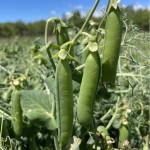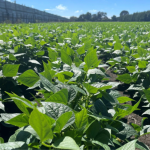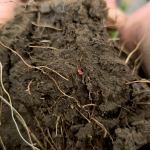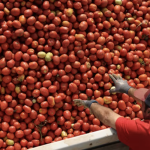What bioacoustics can tell us about soil health
Soil biologists will tell you that the ground beneath our feet is home to more life, with more diversity than almost any other place on earth. One cup of dirt can yield up to 100 million life forms.
Added 4 years ago
By Brenda Newth
Soil biologists will tell you that the ground beneath our feet is home to more life, with more diversity than almost any other place on earth. Just a cup of dirt can yield up to 100 million life forms.
In a new field of science called soil bioacoustics, biologists are capturing underground noises to open a window into our subterranean world. They've found that listening to underground sounds promises to reveal not only what life forms reside below our feet but also how they go about their existence – how they eat or hunt, how they slither past each other unnoticed, or drum, tap and sing to get one another's attention.
Understanding this underground life is important because soil ecology is crucial, for food, for forests, or to fill the air with oxygen. Every soil organism produces its own soundtrack. By distinguishing these sounds, soil acoustics stands to shed light on some long standing questions. Like, when do plant roots grow? At night? During the day? Only when it rains?
As well as travelling through air, soundwaves can also travel through other media, like water or soil. Elephants know this well – they vocalise a low-frequency rumble that propagates through the ground, enabling them to keep in touch with far-flung brethren who pick up the signals with the soles of their feet.
There is already some evidence that plants, at least, make use of sound to help their survival. Tests by Australian universities reported that the pea plants favoured growing roots toward the sound of water, even though the water itself was not accessible to the plants and no moisture could seep into the tubes.
Besides informing ecologists, underground acoustics could help us take better care of the environment and detect pests that cause billions of dollars in damage every year. Without a way to pinpoint infestations, currently farmers have to resort to fighting pests with blanket pesticide applications, that kills all sorts of things underground. Early findings from bioacoustics studies suggest it’s possible to use the frequencies of collected sounds to pinpoint subterranean pest infestations and to identify the species.
Scientists are also finding that the underground orchestra of animal activity has started to fall silent in large tracts of land, particularly in intensely farmed fields, where things go quiet.
A lessening of noises hints at diminished biodiversity and thus a less healthy soil. That dovetails with a recent report by the Food and Agriculture Organisation finding that a third of the world's land has been at least moderately degraded, often through agriculture.
This article was first published by the BBC. You can read it in full here.
Be the first to leave a comment.
Leave a comment
All comments are reviewed before they are published on the website. Your email address will not be published.

Carbon Positive Trial Update – February 2025

Carbon Positive Update

Community Engagement and Knowledge Sharing Strengthen the Carbon Positive Project

Are We Changing Soil Carbon Yet? Three Years In, the Jury’s Still Out

Farewell to Trustee Phil Schofield – A Foundational Leader of the HBFFCT


Join the conversation